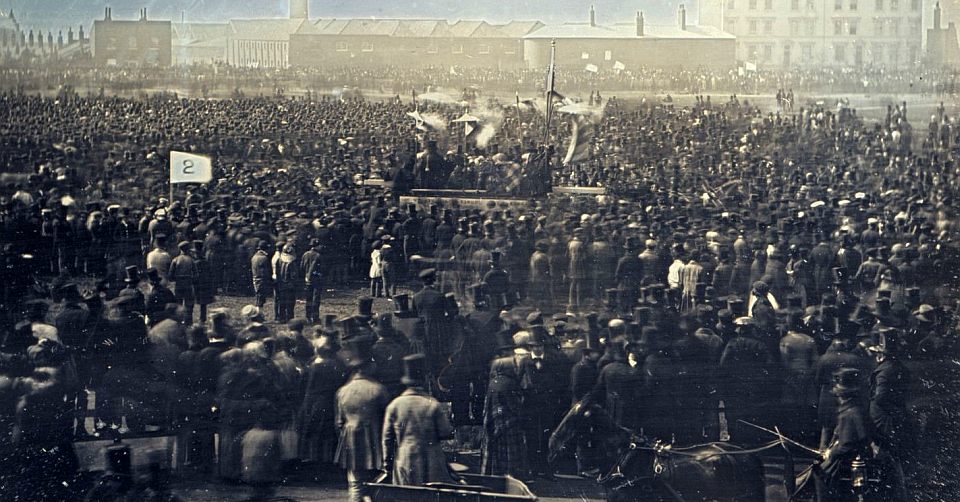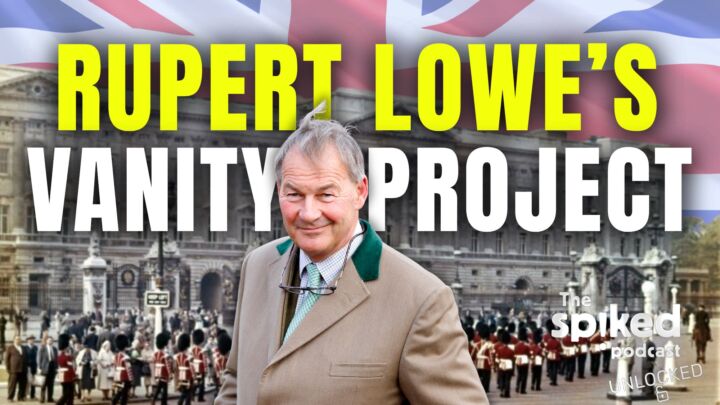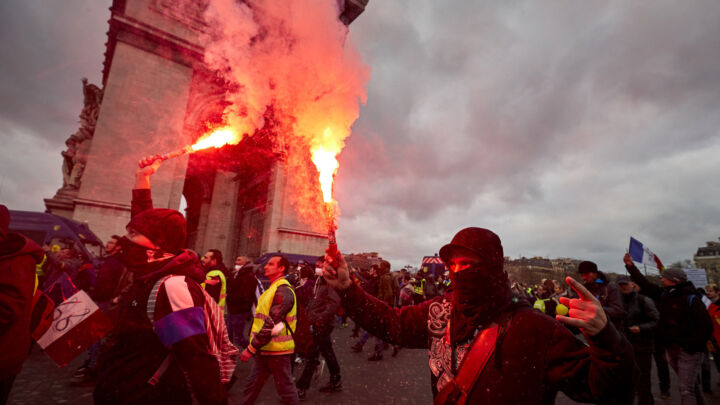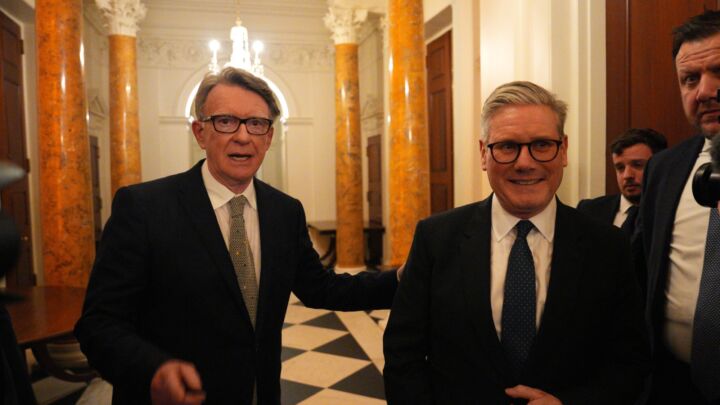
Long-read
The spectre of democracy
Enlightenment thinkers were haunted by the reality of popular self-determination.
Want unlimited, ad-free access? Become a spiked supporter.
Since the Ancient Athenian experiment with democracy, political thinkers and activists have long had an uneasy relationship with the ‘people’. The Enlightenment, which coincided with the Age of Reason and culminated in revolutions in America and France, seemed to represent a perfect opportunity to take the role of popular consent seriously. But unfortunately, this opportunity was never taken. Instead, the intellectual and political currents that prevailed remained suspicious of the people and the exercise of human agency. That today many, even on the left, frown at populism, and fear its power, is at least in part an outcome of the Enlightenment’s uneasy and unresolved relationship with the people.
Enlightenment for the few
The most exciting contribution Enlightenment thinkers made to human development was to encourage historical thinking. Many of its leading minds insisted that there are no eternally fixed features of society, and that social arrangements are subject to variation and transformation. Humans were accorded an important status as subjects of the historical process – or at least its potential subjects. From Condorcet to Saint-Simon, Enlightenment thinkers regarded history as a process of endless progress and, therefore, endless change. They had discovered a new world, one made by man. However, almost all of the Enlightenment’s principal protagonists were unclear about whether this new world included all people or just a select few (1).
In the 18th century, leading Enlightenment figures were more likely to invest their hopes in a reforming legislator or ruler than in the aspirations of the people to improve society. A variety of philosophers, commentators and political economists assigned the legislator or the lawgiver the role of enlightening and educating the public, because they felt the public could not be expected to develop the capacity to reason on its own. The French scholar Louis de Jaucourt (1704-1779) insisted that an enlightened monarch would ensure that government was carried out in ‘rational conformity to the law’ (2). From this perspective, enlightened despots, who were ‘systematically trained and actively rationalising rulers’, had a decisive role to perform (3).
Despite criticising the traditions and the customs of the past, Enlightenment thinkers tended to think they could not quite do without them altogether. The main reason for rationalist thinkers’ ambivalence towards non-rational traditions was their fear of the disorder that would follow the dissolution of traditional institutions. That is why the late 17th-century French sceptic Pierre Bayle, and even the arch-rationalist German philosopher Immanuel Kant, opted for the enlightened rule of the absolute king. The 18th-century concept of ‘enlightened despotism’ showed that, for some, enlightenment depended far more on the contribution of an intelligent, educated despot than on the intellectual resources of the people. That radical philosophers could connect the Enlightenment to dependence on a despot shows the hesitant and partial manner with which they approached democratic freedoms.
So, in short, the anti-traditionalist ideas that characterised the Age of Reason were tempered by the intuition that the unravelling of traditional society invited disorder. That is why the typical Enlightenment critique of traditional forms of authority lacked a consistent democratic dimension. It was principally motivated by the aspiration for more freedom for relatively small groups of educated professionals and entrepreneurs. Enlightenment critics of the old order were not motivated by the democratic impulse; they often merely wanted to replace the rule of the old elites with their own.
Many studies of the Enlightenment era note that new movements from below, for example the peasant rebellion in Bohemia in 1775, or Yemelyan Pugachev’s peasant-backed revolt in Russia in 1773, ‘took the form of a protest by the educated against their exclusion from political power by privileged minorities who based their claim to govern on tradition and prescription’ (4). Typically, these movements represented a relatively narrow constituency. In France, for example, the pre-French Revolution protest movement consisted of sections of the nobility and the legal profession. Likewise, social movements in England, the Netherlands and Geneva ‘represented the views of the educated but unprivileged men who considered themselves unjustly barred from a share of political power’ (5). These movements were not so much against the monarchical divine right to rule, as they were ‘against oligarchies whose claim rested on tradition alone’. This was the orientation of the moderate English movement for parliamentary reform, which began around 1779 and targeted a franchise ‘defended in the name of traditional rights’ (6). However, by its very nature, even a limited interrogation of the authority of tradition fuelled instability and unrest, which threatened the prevailing order. The outbreak of the 1780 Gordon Riots, initially an anti-Catholic protest in London, reminded the elites that the urban masses had a mind of their own. So perturbed were those calling for parliamentary reform, that, from that point onwards, they adopted a far more conservative attitude to political change.
The Gordon Riots even moved Turgot, a French statesman and early advocate of economic liberalism, to exclaim: ‘To what stage [of civilisation] has the human race advanced when in this century we see such fanaticism in London itself?’ (7) In France, it was still more difficult than in England to reconcile the aspiration of the educated middle-class reformers with the traditional order. The French reformers’ call for social equality in a ‘limited sense of the equality of gentlemen and nobles’ sought to establish conditions comparable to those of Britain. But whereas in Britain such attitudes ‘could be defended in the name of tradition’, in France they required the ‘rejection of tradition in the name of abstract principle’ (8). The need to mobilise opinion around principle rather than precedent opened up the question of consent and authority to public scrutiny. In such circumstances, the claim to equality could not be easily monopolised by a minority. That is why the movement for reform in France mutated into a revolutionary one.
Indeed, in France, the Enlightenment critique of the old order had far more revolutionary consequences than elsewhere in Europe because it was impossible to manage change without the involvement of the people. The French Revolution of 1789 represented a turning point in the relationship between the rising middle class who spoke the language of the Enlightenment and their social inferiors. During the 19th century, the question of how to represent the people’s will, or what came to be known as public opinion, became a central question to those preoccupied with the promotion of a rational, enlightened society.
Even radical French Enlightenment thinkers mistrusted the capacity of the people to reason and behave in a rational manner. Take Jean-Jacques Rousseau, a political philosopher usually associated with the radical wing of the Enlightenment. Despite his Romantic view of human nature, he was profoundly pessimistic about the behaviour of real human beings, looking instead to a benevolent educator to give people direction. The French revolutionary leader, Maximilien Robespierre, shared Rousseau’s reservations about the intellectual capacity of the multitude. He regarded individuals as powerless to resist the influence of prejudice and social pressure. ‘Human authority can always be attacked by human pride’, Robespierre claimed. He felt that people lacked the capacity to reason and therefore needed to be instructed by ‘the religious sense by which the soul would be impressed with the idea of a sanction given to moral principles by a power superior to man’. That a radical leader of the French Revolution embraced a ‘power superior to man’ illustrated the hesitant and selective manner in which the Age of Reason dealt with the relationship between individual liberty and authority. Optimistic beliefs about the capacity of education to set the individual free existed alongside the conviction that individuals in the here and now were likely to be ‘wildly wrong’ (9).
Bring back religion
Most 20th- and 21st-century intellectuals and political commentators have regarded public opinion with ambivalence if not unease; they have perceived ordinary people as lacking the intellectual resources for independent thought; they have asserted that the media and commercial advertisers easily manipulate people; and they have claimed that, unlike their educated superiors, ordinary people tend to hold backward, irrational and xenophobic views. As we have seen, these attitudes towards public opinion originate in the 18th century among supporters of the Enlightenment.
Most 18th-century philosophers were at least ambivalent about the power and force of public opinion, and some were openly fearful of it. Rousseau saw public opinion as a corrupting influence from which children had to be protected (10). Like many of his contemporaries, he was preoccupied with how to influence and guide opinion in a constructive direction, and this led to his call for strong press censorship.
Like Rousseau, the Scottish philosopher David Hume also believed that the ‘formation of sound political opinion is the most basic political activity’, and his writings were devoted to understanding and managing it (11). In line with the dominant mood of European political thought, Hume’s attitude towards the power of public opinion became increasingly defensive and weary, as indicated by his anxiety about the influence of the press. Initially, Hume adopted a pragmatic approach towards press freedom. Although he had little sympathy for ‘the people’, he believed that their rational intellectual superiors could exercise influence over the direction of their thinking:
‘A man reads a book or pamphlet alone and coolly. There is none present from whom he can catch passion by contagion… The liberty of the press, therefore, however abused, can scarce ever excite popular tumults… the people are no such dangerous monster as they have been represented, and in every respect better to guide them, like rational creatures, than to lead or drive them like brute beasts.’ (12)
When Hume published his essay Of the Liberty of the Press in 1741, he maintained the hope that it could serve as an effective counterweight to the arbitrary power of the monarch. He defended the press as central to the maintenance of civil liberty. However, disturbances in England during the 1760s and 1770s, in particular the riots following radical journalist John Wilkes’ expulsion from parliament in 1764, undermined Hume’s confidence in the press, an institution that he previously regarded as central to a ‘free and independent government’. So when his essay was republished in 1770, Hume revised his original positive assessment of press freedom and added a final sentence that decried it as ‘one of the evils’ that society had to live with (13). His radical change of attitude towards the press was driven by a fear that the public could be led astray by dangerous demagogues.
In the decades following the French Revolution, French liberals, who were now extremely wary of the power of public opinion, looked back wistfully to an age when religion and tradition influenced public behaviour. The liberal French political commentator, Benjamin Constant, warned that many supporters of revolution ‘failed to appreciate the potential dangers of popular opinion and to consider sufficiently the constraints of historical traditions’ (14). This was hardly a surprise. Most 18th-century political thinkers tended to think of the uneducated lower orders as steeped in the irrational ways of the past. This is why many adherents of the Enlightenment, who personally regarded religion as an outdated prejudice, nevertheless advocated it as a means to contain the unpredictable behaviour of the people. For example, as Harold Laski writes, Voltaire ‘hates religious fanaticism; but he is certain that religion is necessary for the people if the rich are not to be murdered in their beds… the God of Voltaire is a social necessity for the maintenance of order; without him there would be no restraint upon the behaviour of men’ (15).
Many protagonists in the Age of Reason were selective in the way they applied their principles. Even as they were revolting against tradition, they were not confident that rationality, and its institutional expressions, could maintain order and stability. Even some of the most radical leaders of the French Revolution concluded that a revamped form of religion was necessary to secure the loyalty of the masses.
This came to pass on 7 May 1794, when the National Convention declared that ‘the French people recognise the Supreme Being and the immortality of the soul’ and urged ‘worship of the Supreme Being’. Robespierre, the president of the convention, believed that his newly invented religion would unify French citizens, ‘whatever private religious views they might entertain’ (16). Robespierre, who, as we have seen, thought that human reasoning needed supplementing by ‘a power superior to man’, regarded reason as far too fragile an instrument to inspire ordinary citizens (17).
Despite the intensely polarised political climate of the late 18th century, supporters and opponents of the French Revolution agreed that some kind of religion was required to guide public conduct. Mistrust of the people transcended the divide between pro- and anti-Enlightenment commentators. Both conservatives and radicals sought to use religion as an instrument for gaining people’s acquiescence to the prevailing social order.
According to Jonathan Israel’s important study, Enlightenment Contested, a tiny minority of Enlightenment thinkers attempted to rely entirely on the authority of reason, but they were far outweighed by the ‘moderate mainstream’, which opted for combining reason with ‘faith and tradition’ (18). Even Baron d’Holbach, whose The System of Nature (1773) won him a reputation for atheism and was denounced by Voltaire as too extreme, believed that a system of morality was needed to serve as an alternative to the Christian religion he had so forcefully challenged. Holbach, too, shared his fellow intellectuals’ scepticism of the reliability of public opinion. In The Social System (1773), he insisted that only men of property could be relied upon to serve as the representatives of the people. Order, he said, rested on men who were ‘bound to the state by their possessions and interested to conserve them as much as to maintain liberty’. His anxiety regarding the role of opinion was founded on the belief that a significant section of society – those without property – lacked the moral and intellectual character necessary for enlightened behaviour. He did, however, think that education could enlighten a significant section of society and, in line with the prevailing intellectual consensus, assigned this task to a reforming sovereign ruler (19).
Speaking on behalf of the nation
The role of the public and public opinion constituted the greatest political challenge to the Enlightenment. During the 18th century, the leaders of the Enlightenment relied on public opinion to help them gain concessions from the old order. They frequently asserted that the moral authority of public opinion was superior to that of the monarchy. They also claimed that they spoke and acted on behalf of the public. So no matter how uneasy the enlightened elite felt about the people, it was forced to work out a way that would allow it to continue to represent the people and speak on their behalf.
The Enlightenment coincided with a moment in history when governments and rulers were forced to take the public seriously. They were increasingly exposed to public scrutiny and pressure. This meant they were confronted with the question of how to turn abstract public opinion, which they claimed to represent, into a foundational source of authority. Their provisional solution was to reframe the general will of the public as the will of the nation. This was why the citizen emerged as the central category of political discourse during the French Revolution. Through the construction of the modern citizen, individuals became detached from one another and reinscribed as members of a new community – the nation. The French Revolution, therefore, fundamentally altered the prevailing relations of authority, between rulers and ruled.
The nation was now the form through which the general, popular will expressed itself. This principle was enshrined in the French Constitution of 1791, which stated that ‘sovereignty is one, indivisible, inalienable and imprescriptible’ and ‘belongs to the nation; no one section of the people, no one individual can claim the right to exercise it’ (2).
During the revolutionary period, the sovereignty of the people, as embodied in the nation, was depicted as the moral opposite of authority based on divine decree or on heredity and tradition. The triumph of the people over the ancien régime and the destruction of the power of the church and nobility ensured that this new form of sovereignty was backed up by the verdict of history. As Article 3 of the 1789 Declaration of the Rights of Man and of the Citizen states, ‘sources of all sovereignty reside essentially in the nation; no body, no individual can exercise authority that does not proceed from it in plain terms’.
This invocation of the nation as the source of all sovereign authority was paralleled by an outburst of enthusiasm for human liberty and individual rights. For a brief moment, the American and the French revolutions, and the growing influence of liberal and humanist ideals, helped to strengthen the ‘new principle that all sovereign authority emanates from the nation as a whole and that the central government is the only legitimate executor of that authority’ (21).
The development of the idea of national sovereignty provided Enlightenment-era elites with an opportunity to avoid having to deal directly with the issues of popular consent and democracy. The institutions that were built to represent the nation could claim sovereign authority without needing to establish a direct relationship with the people. By the turn of the 19th century, the nation state emerged as the institution through which sovereignty gained meaning. The Enlightenment’s turn towards the state was most strikingly articulated in the work of Hegel, who represented the nation state as the realisation of human reason.
The discovery of the nation allowed Enlightenment thinkers to avoid confronting the challenge posed by popular sovereignty. However, despite its limitations, documents like the Declaration of the Rights of Man and of the Citizen did take the question of sovereignty seriously. The workings of national sovereignty could be interpreted in many different ways, but at least, in principle, it did not preclude the establishment of institutions based on popular consent.
In today’s world, the very idea of sovereignty faces constant challenge. Sections of the political elite are uncomfortable with it. This is why, in Europe, national sovereignty is frequently contrasted unfavourably with cosmopolitan institutions like the European Union. Today, suspicion and hostility towards populism marches hand-in-hand with enmity towards national sovereignty. Enlightenment attitudes towards popular consent were often flawed and even cowardly, but, even at their worst, they stand in favourable contrast to the anti-democratic sensibility of 21st-century European technocrats.
That many Enlightenment thinkers and political activists lost their nerve when confronted with the prospect of popular democracy is beyond doubt. However, despite attempts to hide behind the Great Legislator or the Supreme Being, the philosophy of the 18th century could not help but endow public opinion with moral authority. In its battle with the ancien régime, issues like consent and sovereignty necessarily came to the fore. Not even the idealisation of the nation and the deification of the state could obscure the fact that sovereignty was directly or indirectly connected to popular consent. In this sense, despite the evasions and elisions, the Enlightenment constituted an important step forward. Today, when sovereignty is routinely devalued, it is important to uphold this 18th-century legacy. It is even more important to stop dodging the question of popular sovereignty and take seriously the will of the people.
Frank Furedi is a sociologist and commentator. His latest book, Power of Reading: From Socrates to Twitter, is published by Bloomsbury Continuum. (Order this book from Amazon UK.)
(1) The argument contained in this essay is developed at length in Authority: A Sociological History, by Frank Furedi, Cambridge University Press, 2013
(2) ‘The Idea of Authority in the West’, by L Krieger in The American Historical Review, Vol 82, No 2, 1977
(3) ‘The Idea of Authority in the West’, by L Krieger in The American Historical Review, Vol 82, No 2, 1977
(4) The Enlightenment: An Evaluation of its Assumptions and Values, by N Hampson, Penguin Books, 1982, p181
(5) The Enlightenment: An Evaluation of its Assumptions and Values, by N Hampson, Penguin Books, 1982, p181
(6) The Enlightenment: An Evaluation of its Assumptions and Values, by N Hampson, Penguin Books, 1982, pp182-183
(7) Cited in ‘Turgot: The Rejection of Enlightened Despotism’, by JG Cavanaugh, French Historical Studies, Vol 6, No 1, 1969
(8) The Enlightenment: An Evaluation of its Assumptions and Values, by N Hampson, Penguin Books, 1968, p255
(9) A Revolution of the Mind: radical Enlightenment and the Intellectual Origins of Modern Democracy, by J Israel, Princeton University Press, 2010, p1
(10) ‘Rousseau’s Images of Authority (Especially in La Nouvelle Heloise)’, by J Shklar, in Cambridge Companion To Rousseau, edited by P Riley, Cambridge University Press, 2001, p160
(11) Hume; Political Essays, edited by K Haakonssen, Cambridge University Press, 1994, pXXVII
(12) Cited in Enlightenment; Britain and the Creation of the Modern World, by R Porter, Allen Lane, 2001, p192
(13) Hume; Political Essays, edited by K Haakonssen, Cambridge University Press, 1994, p5
(14) ‘Benjamin Constant, the French Revolution, and the Origins of French Romantic Liberalism’, by KS Vincent, French Historical Studies, Vol 23, No 4, p623 (2000)
(15) The Rise Of European Liberalism, by HJ Laski, George Allem & Unwin, 1936, pp213-214
(16) The Age of the Democratic Revolution: The Struggle, by RR Palmer, Princeton University Press, 1969, p127
(17) The Age of the Democratic Revolution: The Struggle, by RR Palmer, Princeton University Press, 1969, p128
(18) Enlightenment Contested; philosophy, Modernity, and the Emancipation of Man 1670-1752, by J Israel, Oxford University Press, 2006, p11
(19) See A History Of Political Theory, by G Sabine, Henry Holt and Company, 1961, pp.569-570
(20) Cited in ‘Citizen and State Under The French Revolution’, by L Jaume, in The Enlightenment; Critical Concepts in Historical Studies, edited by RP Hanley and DM McMahon, Routledge, 2010, p157
(21) Kings or People; Power and the Mandate to Rule, R Bendix, University of California Press, 1978, p596
You’ve hit your monthly free article limit.
Support spiked and get unlimited access.
Support spiked and get unlimited access
spiked is funded by readers like you. Only 0.1% of regular readers currently support us. If just 1% did, we could grow our team and step up the fight for free speech and democracy.
Become a spiked supporter and enjoy unlimited, ad-free access, bonus content and exclusive events – while helping to keep independent journalism alive.
Monthly support makes the biggest difference. Thank you.








Comments
Want to join the conversation?
Only spiked supporters and patrons, who donate regularly to us, can comment on our articles.